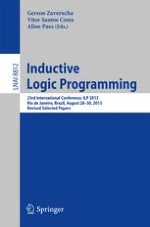2014 | OriginalPaper | Chapter
On Differentially Private Inductive Logic Programming
Authors : Chen Zeng, Eric Lantz, Jeffrey F. Naughton, David Page
Published in: Inductive Logic Programming
Publisher: Springer Berlin Heidelberg
Activate our intelligent search to find suitable subject content or patents.
Select sections of text to find matching patents with Artificial Intelligence. powered by
Select sections of text to find additional relevant content using AI-assisted search. powered by
